The Booking Club
All Episodes
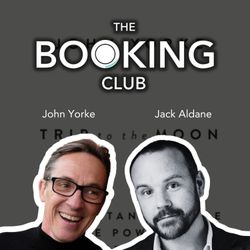
Understanding the True Power of Story, with John Yorke
53:22|To command narrative is to control a sometimes frightening power. What is it that turbocharges some tales, and how is it possible to harness that potency?John Yorke’s groundbreaking bestseller, Into the Woods, revolutionised our understanding of story structure. This new book delves deeper into how to put that structure to work in the world. Trip to the Moon takes us on a journey not just through drama and fiction but through politics, religion and non-western narrative. Through these terrains, Yorke seeks out the role of story in all our lives, examining how to utilise its lessons to create life-changing tales – and, in a world aflame with conspiracy theories, to guard ourselves against their darker purpose too.Revealing the artful symmetry and underlying principles that connect Summer beach reads to Classical Chinese poetry, superhero flicks to Russian arthouse, and classical rhetoric to state propaganda, Yorke makes dazzling connections that show how stories have the power to transfigure the chaos of our existence into a new equilibrium, and make the world anew.John and Jack meet at The Fig and Walnut in Bloomsbury.Follow and subscribe to The Booking Club:YouTube: @bookingclubpodTwitter/X: @bookingclubpodBlue Sky: @bookingclubpod.bsky.socialInstagram: @bookingclubpodTikTok: @bookingclubpod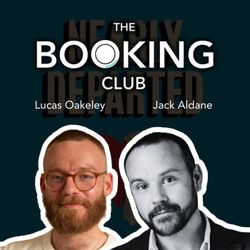
Men, Love, and Modern Literature, with Lucas Oakeley
28:55|Joel Foster is a hapless twenty-something. His girlfriend, Beth Lewis, would likely have been a hapless twenty-something, too, had she not been obliterated by a very large cement truck.Some time after Beth’s tragic death, Joel is still trying to juggle grief with the world of modern dating. And while he still feels like a widower, he has to find a new love before three years is up.The catch? Just as Joel thinks he’s finally falling for someone, he starts getting haunted by Beth. It’s not a ghost story, it’s a love story. With ghosts.Nearly Departed is novelist Lucas Oakeley's first work of fiction. When not writing novels, Lucas is a food journalist and book influencer tirelessly recommending books for boys and advocating for men in general to choose reading over watching YouTube Shorts, flirting with ChatGPT or disappearing down another Reddit hole.Starting the new year over a gorgeous Ethiopian plate, he and Jack discuss men, love and modern book culture.Lucas and Jack meet at Zeret Kitchen in Camberwell, South London.Follow and subscribe to The Booking Club:YouTube: @bookingclubpodTwitter/X: @bookingclubpodBlue Sky: @bookingclubpod.bsky.socialInstagram: @bookingclubpodTikTok: @bookingclubpod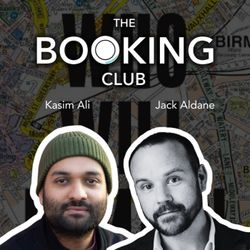
Who Will Remain: a novel, with Kasim Ali
41:45|Who Will Remain by Kasim Ali is a powerful new novel following a young man as he weighs up the life of safety that his parents want for him and another path on the streets outside his door, from the acclaimed author of Good Intentions.Amir has grown up in Alum Rock, Birmingham, under the care of his sensible older brother, Bilal, and his cousin Saqib, born just a few days before Amir. Alum Rock can be a troubled place, but Amir has managed to keep his head down, worked hard and stayed out of trouble … until now.When Saqib is killed in a gang fight and Bilal announces his engagement, Amir suddenly loses the two men who keep him grounded. Amir’s university grades are collapsing, he’s running out of money, and pressure mounts from every direction. As tensions flare, the friends left around him start to draw Amir into their more dangerous pursuits, and the family ties that have bound him so completely begin to unravel.Amir decides he only has himself to rely on and must take his future into his own hands.This is a blistering story of social expectations and social condemnation, of dead ends and divided loyalties, and of what’s left behind when you have nothing left to lose. (Harper Collins)Kasim meets Jack at Salim's in Turnpike Lane, North London.Follow and subscribe to The Booking Club:YouTube: @bookingclubpodTwitter/X: @bookingclubpodBlue Sky: @bookingclubpod.bsky.socialInstagram: @bookingclubpodTikTok: @bookingclubpod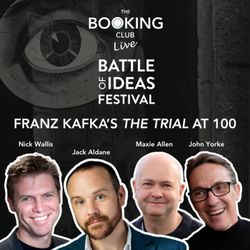
Franz Kafka's The Trial at 100, from The Battle of Ideas Festival 2025
37:50|This episode is lifted from a live recording that took place at The Battle of Ideas Festival 2025 in Westminster on Saturday 18th October.Jack draws together a panel of three speakers carefully selected to provide a modern perspective on the lasting significance of Franz Kafka's The Trial, which turns 100 this year.The panel featured Maxie Allen, radio producer for Times Radio, Nick Wallis, journalist and author of The Great Post Office Scandal, and John Yorke, narrative expert, author of Into the Woods: How Stories Work and Why We Tell Them, and presenter of BBC Radio 4’s Opening Lines. From Nick's relentless coverage of one of the biggest state-facilitated corporate assaults on working people ever recorded in British history, to Maxie's own brush with the absurdity of modern British policing earlier this year, to John's revivifying appraisal of the text, this discussion will make you wish you'd read the The Trial sooner.A big thank to the Academy of Ideas, and to our excellent audience on the day.Follow and subscribe to The Booking Club:YouTube: @bookingclubpodTwitter/X: @bookingclubpodBlue Sky: @bookingclubpod.bsky.socialInstagram: @bookingclubpodTikTok: @bookingclubpod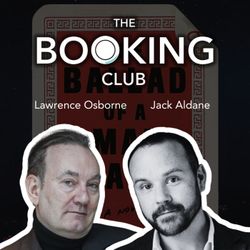
The Ballad of a Small Player: from acclaimed novel to Netflix hit, with Lawrence Osborne
44:04|A riveting tale of risk and obsession set in the alluring world of Macau’s casinos, by the author of the critically acclaimed The Forgiven. As night falls on Macau and the neon signs that line the rain-slick streets come alive, Doyle – “Lord Doyle” to his fellow players – descends into his casino of choice to try his luck at the baccarat tables that are the anchor of his current existence. A corrupt English lawyer who has escaped prosecution by fleeing to the East, Doyle spends his nights drinking and gambling and his days sleeping off his excesses, continually haunted by his past. Taking refuge in a series of louche and dimly lit hotels, he watches his fortune rise and fall as the cards decide his fate. In a moment of crisis he meets Dao-Ming, an enigmatic Chinese woman who appears to be a denizen of the casinos just like himself, and seems to offer him salvation in the form of both money and love. But as Doyle attempts to make a rare and true connection, all that he accepts as reality seems to be slipping from his grasp. Resonant of classics by Dostoevsky and Graham Greene, The Ballad of a Small Player is a timeless tale steeped in eerie suspense and rich atmosphere.NOW ON NETFLIX: the adaptation of Ballad of a Small Player, starring Colin Farrell, Fala Chen, Deanie Ip, Alex Jennings, and Tilda Swinton. Lawrence meets Jack at Defune in Marylebone, London.Follow and subscribe to The Booking Club:YouTube: @bookingclubpodTwitter/X: @bookingclubpodBlue Sky: @bookingclubpod.bsky.socialInstagram: @bookingclubpodTikTok: @bookingclubpod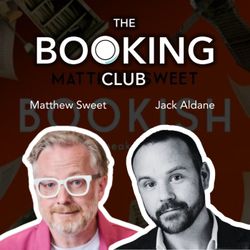
Bookish: Murder Speaks Volumes, with Matthew Sweet
37:18|Adapted from the major television series created by Mark Gatiss – out now!London, 1946. Gabriel Book is an erudite and unconventional London bookseller married to Trottie, the owner of the wallpaper shop next door. He is also a sleuth who uses the chaotic riches of his stock to crack the puzzling cases that come his way.He does not work alone. Book’s shop is a magnet for waifs and strays – some of whom bring mysteries of their own to his door. There’s Nora, sometime bookseller and true crime enthusiast; Dog, connoisseur of ginger biscuits and then Jack, whose arrival at the shop forces Book to confront a loose end from his own past.Clever, endearing and entertaining, Bookish by Matthew Sweet is a warm-hearted and unexpected mystery, about books, murder and the secrets we all keep.Follow the trail of the investigation in Matthew's brilliant adaptation.Matthew meets Jack at Gurkha's in Sydenham, South London.Follow and subscribe to The Booking Club:YouTube: @bookingclubpodTwitter/X: @bookingclubpodBlue Sky: @bookingclubpod.bsky.socialInstagram: @bookingclubpodTikTok: @bookingclubpod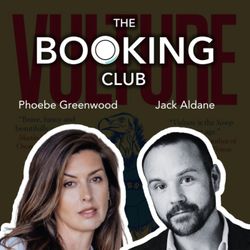
Vulture: a novel, with Phoebe Greenwood
27:29|Catch-22 on speed and set in the Middle East, Vulture is a fast-paced, brilliant satire of the war news industry and its moral blind spots.An ambitious young journalist, Sara is sent to cover a war from the Beach Hotel in Gaza. The four-star hotel is a global media hub, promising safety and generator-powered internet, with hotel staff catering tirelessly to the needs of the world’s media, even as their homes and families are under threat.Sara is determined to launch herself as a star correspondent. So, when her fixer Nasser refuses to set up the dangerous story she thinks will win her a front page, she turns instead to Fadi, the youngest member of a powerful militant family. Driven by demons and disappointments, Sara will stop at nothing to prove herself in this war, even if it means bringing disaster upon those around her.Phoebe Greenwood’s debut novel brings readers into the heart of the maelstrom, and with audacity and humour depicts the media’s complicity in the ongoing tragedy. (Europa Editions)Phoebe meets Jack at Hiba Express, on High Holborn in Central London.Please feel free to donate to Medical Aid for Palestinians: www.map.org.ukFollow and subscribe to The Booking Club:YouTube: @bookingclubpodTwitter/X: @bookingclubpodBlue Sky: @bookingclubpod.bsky.socialInstagram: @bookingclubpodTikTok: @bookingclubpod
Fiction First: The Booking Club LIVE
01:32:53|On Wednesday 16 July this year, The Booking Club in collaboration with Conduit Books launched Fiction First, an event dedicated to the experience and status of the modern novel and novelist.At 21Soho, we heard from a panel of 2025's most exciting debut writers about what led them to produce their first works of fiction. Guests discussed their journeys to publication, their literary influences, and what drew them to writing fiction in the first place, as well as how they got their first break. Central to the discussion was the subject of how class, race, sexuality and gender made an impact on their fiction and individual writer's journey, and what the future holds for the novel in a world saturated with seductive visual media.The six authors were:📚 Nicolas Padamsee, author of England is Mine📚 Thomas Peermohamed Lambert, author of Shibboleth📚 Lisa Smith, author of Jamaica Road📚 Harriet Armstrong, author of To Rest Our Minds and Bodies📚 William Rayfet Hunter, author of Sunstruck📚 Rowe Irvin, author of Life Cycle of a MothFollow and subscribe to The Booking Club:YouTube: @bookingclubpodTwitter/X: @bookingclubpodBlue Sky: @bookingclubpod.bsky.socialInstagram: @bookingclubpodTikTok: @bookingclubpod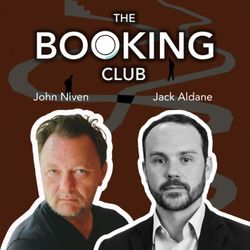
The Fathers: a novel, with John Niven
37:06|In a busy maternity ward, first-time father Dan meets Jada, a dad welcoming his fifth – no, sixth? – child into the world. Dan and Jada come from very different places: both called Glasgow. Dan is a successful TV writer with a townhouse in the West End and a shiny Tesla ready to drive his wife and baby home. Jada is a hustling, small-time criminal who is already planning how to separate Dan from some of the luxuries Jada has never been able to enjoy in his tiny flat in a Brutalist sixties council block.Both men find that the birth of their sons has fired their ambitions. Dan plans to walk away from his saccharine TV success and finally knuckle down to writing that novel he always felt he had in him. While, for Jada, it’s the opportunity for one last get-rich-quick scheme – ripping off a local airport. When a tragedy occurs, their worlds are brought closer than either could ever have imagined – close enough that it could mean destruction for both of them … (Canongate Books)Born in 1966, John Niven is a Scottish author and screenwriter. His books include Kill Your Friends, The Amateurs, The Fuck-It List and The Second Coming.John meets Jack at Scott's in MayfairFollow and subscribe to The Booking Club:YouTube: @bookingclubpodTwitter/X: @bookingclubpodBlue Sky: @bookingclubpod.bsky.socialInstagram: @bookingclubpodTikTok: @bookingclubpod
loading...